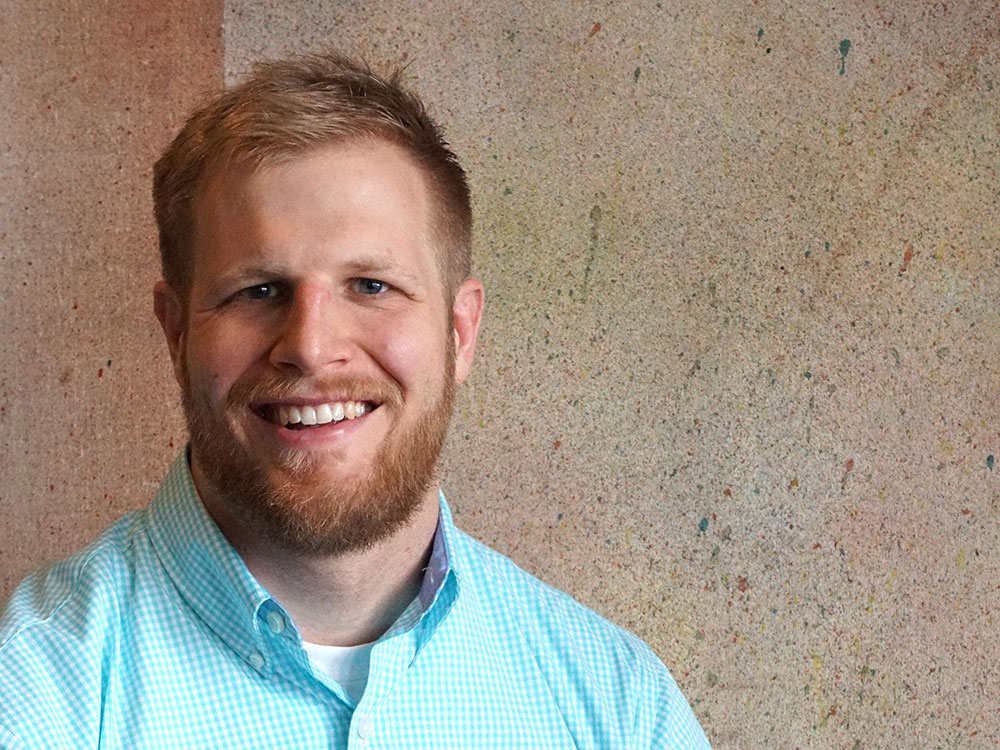Matthew Vetter has been a staple of the Alford Community Leadership & Involvement Center (CLIC) team since 2013 and has assisted in developing programs for the Denison community to engage students in service and leadership. In addition to his work at Denison, Vetter has spent the past four years working on his PhD from Azusa Pacific University. His work with CLIC has provided a meaningful foundation for his doctoral research; it only makes sense that his research focuses on better ways to facilitate student success through involvement in co-curricular activities. Vetter recently completed his PhD this summer and intends to put all his hard work and research to use within the Denison community.
Q: What is your job title and what does this campus role entail?
My title is the Director of the Alford Community Leadership & Involvement Center (CLIC). CLIC co-curricular programs include the areas of civic engagement and service (e.g. DCA), student organizations, campus-wide programs (e.g., UPC, Culture Jam, etc.), leadership development (e.g., Leadership Fellows), and fraternity and sorority life. In addition to overseeing and supporting the work of the rest of CLIC team, I directly advise the Leadership Fellows and help to plan programs like DU Lead and the LeaderShape Institute.
Q: What was your dissertation topic and what were some of your most interesting findings?
My research focused on trying to learn more about the ways that students benefit from involvement on campus. Specifically, I was interested in learning about how the quality and quantity of co-curricular involvement predicts student thriving in college. The results showed that quality of involvement is much more important than the quantity of involvement in an activity or organization. This means that students benefit more when they choose one or two organizations in which to deeply invest their time and energy.
Doing things like volunteering to help with the group’s events or taking on a leadership role in an organization (even if only in one group), will put students in situations where they can learn and grow. The results also showed that faculty play an important role in creating meaningful co-curricular experiences. When students experience classes where diverse experiences and perspectives are valued and shared, students bring those skills back to their campus organizations and leadership roles and help create inclusive environments outside of the classroom.
The results showed that quality of involvement is much more important than the quantity of involvement in an activity or organization.
Q: How does your research apply to the Denison community? Are there any programs or initiatives that you are considering starting based on your research findings?
At Denison we are are doing a lot to help students refine their involvement and focus on those activities that are most important to them. At the Involvement Fair, we ask new students to fill out a guide and consider how much time they want to spend in a campus organization. During programs like DU Lead and the LeaderShape Institute, we challenge students to choose one area of involvement they want to focus on. Currently, the Leadership Fellows are working on developing a new mentorship and leadership program that could help student focus their involvement. CLIC is also considering ways to engage and support faculty who advise student organizations.
Q: How can Denison and its students benefit from your findings? How will your research play a role in the ways in which you approach your work at CLIC?
Denison students already do a great job of getting involved on campus. Sometimes these activities are just for fun, other times they’re a way to meet and connect with friends. Whatever the reason for getting involved, it’s important to consider that maintaining a balanced level of involvement actually contributes to your success in college. In addition to being part of the campus community, being meaningfully involved in a campus organization can help student become better leaders, better learners, better citizens, and better able to understand diverse perspectives. There is a lot you can learn from being involved.
Q: How will you fill all your free time now that you won’t have to be dedicated all of those evenings of reading and writing for your PhD?
It’s a game-changer! Lately, I have been taking up some home improvement projects like refinishing our back patio. My wife and I are also looking forward to taking some weekend trips this fall to visit family and friends that we haven’t been able see in a while. Plus, there’s still some writing that I’d like to do so I can share the findings of my dissertation research with professionals at other campuses.






